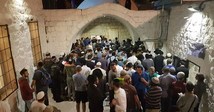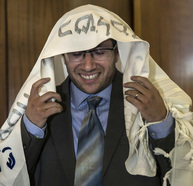25 sept 2016

Facebook continues to block the Palestine Dialog Forum Net, although it has apologized for disabling Palestinian accounts of journalists and media centers mistakenly as it claimed.
Facebook suspended, during the last few days, a large number of pages supporting the Palestinian people's resistance against the Israeli occupation.
The page of the Palestine Dialog Forum had been disabled several times before. However, the forum created a new Facebook, which can be visited through the link " https://www.facebook.com/paldf.p/."
Facebook's repeated closure of Palestinian pages are believed to be related to its agreement with the Israeli government to monitor and block pages advocating the Palestinian people's right to resist the occupation.
Facebook suspended, during the last few days, a large number of pages supporting the Palestinian people's resistance against the Israeli occupation.
The page of the Palestine Dialog Forum had been disabled several times before. However, the forum created a new Facebook, which can be visited through the link " https://www.facebook.com/paldf.p/."
Facebook's repeated closure of Palestinian pages are believed to be related to its agreement with the Israeli government to monitor and block pages advocating the Palestinian people's right to resist the occupation.

Pro-Palestine activists have launched on Twitter a campaign calling for boycotting Facebook on Sunday, September 25, for two hours from 8 to 10 pm according to Jerusalem local time.
The campaign is an initiative aimed at responding to Facebook's removal of pages supporting Palestine and resistance activities against the occupation.
The campaigners also created the hashtag page "#FBCensorsPalestine" on Twitter to condemn the Facebook blocking policy against pro-Palestinian pages.
The Facebook administration recently deleted a large number of pages advocating the Palestinian people's resistance against the occupation, including pages belonging to pro-Palestinian activists and the Hamas Movement.
The campaign is an initiative aimed at responding to Facebook's removal of pages supporting Palestine and resistance activities against the occupation.
The campaigners also created the hashtag page "#FBCensorsPalestine" on Twitter to condemn the Facebook blocking policy against pro-Palestinian pages.
The Facebook administration recently deleted a large number of pages advocating the Palestinian people's resistance against the occupation, including pages belonging to pro-Palestinian activists and the Hamas Movement.
23 sept 2016

Facebook administration has banned a large number of pro-Palestinian pages and accounts including Hamas-affiliated pages.
The Facebook administration closed over the past few hours several pro-Palestinian pages and accounts, some of which were banned for the tenth time.
A number of online activists accused the administration of online social networking service Facebook of deliberately suspending their accounts to silence the pro-Palestinian pages.
Other Hamas members and activists have also voiced similar complaints. The activists stressed that they never wrote anything on the banned pages that could violate the Facebook’s rules.
Filastin al-Hiwar Facebook page which has over 145,000 followers, has also been abruptly suspended by Facebook.
Over the past few days, two Israeli government ministers met top Facebook officials to discuss ways of collaboration between the two parties.
The Israeli ministers and Facebook officials have agreed to work together to determine “how to tackle incitement on the social media network,” according to Israeli newspaper.
The Facebook administration closed over the past few hours several pro-Palestinian pages and accounts, some of which were banned for the tenth time.
A number of online activists accused the administration of online social networking service Facebook of deliberately suspending their accounts to silence the pro-Palestinian pages.
Other Hamas members and activists have also voiced similar complaints. The activists stressed that they never wrote anything on the banned pages that could violate the Facebook’s rules.
Filastin al-Hiwar Facebook page which has over 145,000 followers, has also been abruptly suspended by Facebook.
Over the past few days, two Israeli government ministers met top Facebook officials to discuss ways of collaboration between the two parties.
The Israeli ministers and Facebook officials have agreed to work together to determine “how to tackle incitement on the social media network,” according to Israeli newspaper.
22 sept 2016

A number of Palestinian civilians were left injured on early Thursday morning as hundreds of Israeli fanatic settlers stormed at dawn on Thursday Joseph’s Tomb, in eastern Nablus province, under a heavy police escort.
Eyewitnesses said buses carrying extremist Israeli settlers rolled into eastern Nablus at predawn time.
The Israeli occupation troops closed the Amman Street, adjacent to Joseph’s Tomb, and climbed over the rooftops of civilian homes.
At the same time an Israeli reconnaissance drone kept hovering over the territory at a low altitude all the way through the break-in.
Clashes reportedly burst out near the Askar and Balata refugee camps. Two Palestinian youngsters sustained injuries during the clashes.
Youngster Muhammad Hashash was rushed to a local clinic so as to be urgently treated for the bullet injuries sustained in his leg.
Several Palestinian families at the Balata refugee camp choked on teargas in the assault.
Recently, Israeli fanatic settlers published an ad on a private website mobilizing mass participation in break-ins at Joseph’s Tomb at least once every couple of weeks.
Violent clashes further rocked al-Feraa refugee camp, to the east of Nablus, after Israeli army troops stormed the area and raked through residential neighborhoods. Activist Bassam Shaweesh said the Israeli soldiers kidnapped citizen Sofiane Abdul Hameed after they wreaked havoc on his family home.
Three more youngsters were kidnapped by the occupation troops in the assault. The Israeli forces chased down a number of Palestinian workers on their way to their workplaces and showered the area with randomly-unleashed spates of bullet fire.
Eyewitnesses said buses carrying extremist Israeli settlers rolled into eastern Nablus at predawn time.
The Israeli occupation troops closed the Amman Street, adjacent to Joseph’s Tomb, and climbed over the rooftops of civilian homes.
At the same time an Israeli reconnaissance drone kept hovering over the territory at a low altitude all the way through the break-in.
Clashes reportedly burst out near the Askar and Balata refugee camps. Two Palestinian youngsters sustained injuries during the clashes.
Youngster Muhammad Hashash was rushed to a local clinic so as to be urgently treated for the bullet injuries sustained in his leg.
Several Palestinian families at the Balata refugee camp choked on teargas in the assault.
Recently, Israeli fanatic settlers published an ad on a private website mobilizing mass participation in break-ins at Joseph’s Tomb at least once every couple of weeks.
Violent clashes further rocked al-Feraa refugee camp, to the east of Nablus, after Israeli army troops stormed the area and raked through residential neighborhoods. Activist Bassam Shaweesh said the Israeli soldiers kidnapped citizen Sofiane Abdul Hameed after they wreaked havoc on his family home.
Three more youngsters were kidnapped by the occupation troops in the assault. The Israeli forces chased down a number of Palestinian workers on their way to their workplaces and showered the area with randomly-unleashed spates of bullet fire.
21 sept 2016

Facebook's fourth user Arie Hasit was more interested in Jewish texts and modern Hebrew than computer science. And so, as his three college roommates were working on what would become a social media giant, he was busy leading a Jewish prayer community on campus.
When Facebook founder Mark Zuckerberg was launching a social media revolution 12 years ago, one of his suitemates at Harvard University was pursuing a different status: becoming a rabbi in Israel.
Arie Hasit finally achieved his dream this month when, after years studying Jewish texts and passing a final exam, he was ordained at the Schechter Rabbinical Seminary in Jerusalem.
For the last decade, the 33-year-old native of Cherry Hill, New Jersey, has faced constant questions from peers and strangers about his life path and whether he missed an opportunity to get in on the ground floor of a company that has grown into a $360 billion behemoth.
Hasit admitted to occasionally wondering what might have been had he joined the tiny startup that Zuckerberg and three other suitemates were working on. Zuckerberg's net worth has been estimated by Forbes magazine at over $55 billion.
In 2004, Hasit became Facebook's fourth user, after Zuckerberg and co-founders Chris Hughes and Dustin Moskovitz. As the site became popular at Harvard, Hasit said he approached them and offered to help. Hasit, a student of history and modern Hebrew with no interest in computer science, was gently rebuffed.
"They were like, 'Arie, we like you and you're our friend,' and that was definitely true, we'd continue to hang out socially, 'but no, you don't have anything to offer here,'" Hasit recalled.
He took their comments in stride—and continued to ignore his parents' urging that he study computer science. He was busy leading a Jewish prayer community on campus and writing for the Harvard Political Review. Zuckerberg dropped out of Harvard at the end of that school year and moved to Silicon Valley. Hasit graduated in 2005 with a double major in history and Near Eastern languages and civilizations. He wrote his thesis on Israeli hip-hop.
"The real question was, was he going to be the Israeli hip-hop professor or a rabbi?" said Zach Bercu, who studied at Harvard and met Hasit through the Jewish community. "I don't think there was another route."
Just a year before he lived with Zuckerberg, Hasit was having trouble with the dorm lottery system, which allows students to request to live in the same building: Hasit said some friends backed out at the last minute. So he collected money from friends and published an enormous ad in the Harvard Crimson newspaper soliciting candidates. The paper called it "the most unabashedly desperate and intrepid" housing lottery move.
Through the ad, he met a close friend, and through the Jewish fraternity Alpha Epsilon Pi, he met Zuckerberg. In Hasit's junior year, the three decided to live together in a suite with four other men. Four of the seven would go on to found the social networking giant.
While watching Facebook grow from a distance, Hasit immigrated to Israel after graduation and enlisted in the army, where he worked as a spokesman to foreign media. He never bragged about his famous college roommate, but word eventually got out.
"People said, 'You're nuts. What happened to you?'" said Aliza Landes, a fellow American who served with Hasit. During her time in the military, Landes founded the IDF's social media desk. Hasit, she said, did not get involved.
Hasit did experience a moment of brief stardom. Benjy Rutland, an officer in his unit, said he remembers Hasit's delight when he watched "The Social Network," a Hollywood film about Facebook's launch at Harvard, and caught a glimpse of a minor character in the film wearing a skullcap and playing drums. Hasit, himself an amateur drummer, said it was a "plausible" representation of him.
"He was happy there was something he could sort of hang his hat on," Rutland said.
Although he didn't become a founder, Hasit said he has managed to cash in somewhat on the global phenomenon born in his college dorm.
Shortly after Facebook's initial public offering in May 2012, Hasit said he bought shares that have "done well." Hasit has also used Facebook to attract 93,000 followers to read his posts, which reflect his liberal take on Jewish tradition.
In a recent Facebook missive, Hasit argued for tolerance in Judaism of gay men — a position that put him at odds with the country's Orthodox rabbinic establishment. He based his view on a verse in Genesis that says: "It is not good for a human to be alone." A Jewish gay couple contacted him after reading the post, and he officiated their wedding, he said.
Hasit last week completed a five-year rabbinical study program that included a master's degree in the Talmud.
As a Conservative rabbi, he faces a significant challenge in Israel. Although the Reform and Conservative movements are dominant among American Jews, they have struggled for recognition in Israel, where ultra-Orthodox rabbinic authorities hold a monopoly over religious affairs. The smaller movements take more liberal positions on traditional religious issues, such as tolerance for homosexuality and rejecting gender segregation.
Hasit recently married, has a baby girl, and in August moved to the small Israeli town of Mazkeret Batya, where he will serve as rabbi to a fledgling congregation.
He says he'll make about $25,000 a year after taxes, standard for a starting Conservative rabbi in Israel.
Zuckerberg, via Facebook, declined an interview request. Hasit also declined to discuss their relationship or say the last time they spoke. But he said his time living with Facebook's founders remains an influence, and he sometimes wonders how things might have been different if he had taken a different path.
"It was good to be exposed to people who take risks," he said. Then, he quipped, "every time I go into overdraft, I do wonder if it would have been smarter to join them."
When Facebook founder Mark Zuckerberg was launching a social media revolution 12 years ago, one of his suitemates at Harvard University was pursuing a different status: becoming a rabbi in Israel.
Arie Hasit finally achieved his dream this month when, after years studying Jewish texts and passing a final exam, he was ordained at the Schechter Rabbinical Seminary in Jerusalem.
For the last decade, the 33-year-old native of Cherry Hill, New Jersey, has faced constant questions from peers and strangers about his life path and whether he missed an opportunity to get in on the ground floor of a company that has grown into a $360 billion behemoth.
Hasit admitted to occasionally wondering what might have been had he joined the tiny startup that Zuckerberg and three other suitemates were working on. Zuckerberg's net worth has been estimated by Forbes magazine at over $55 billion.
In 2004, Hasit became Facebook's fourth user, after Zuckerberg and co-founders Chris Hughes and Dustin Moskovitz. As the site became popular at Harvard, Hasit said he approached them and offered to help. Hasit, a student of history and modern Hebrew with no interest in computer science, was gently rebuffed.
"They were like, 'Arie, we like you and you're our friend,' and that was definitely true, we'd continue to hang out socially, 'but no, you don't have anything to offer here,'" Hasit recalled.
He took their comments in stride—and continued to ignore his parents' urging that he study computer science. He was busy leading a Jewish prayer community on campus and writing for the Harvard Political Review. Zuckerberg dropped out of Harvard at the end of that school year and moved to Silicon Valley. Hasit graduated in 2005 with a double major in history and Near Eastern languages and civilizations. He wrote his thesis on Israeli hip-hop.
"The real question was, was he going to be the Israeli hip-hop professor or a rabbi?" said Zach Bercu, who studied at Harvard and met Hasit through the Jewish community. "I don't think there was another route."
Just a year before he lived with Zuckerberg, Hasit was having trouble with the dorm lottery system, which allows students to request to live in the same building: Hasit said some friends backed out at the last minute. So he collected money from friends and published an enormous ad in the Harvard Crimson newspaper soliciting candidates. The paper called it "the most unabashedly desperate and intrepid" housing lottery move.
Through the ad, he met a close friend, and through the Jewish fraternity Alpha Epsilon Pi, he met Zuckerberg. In Hasit's junior year, the three decided to live together in a suite with four other men. Four of the seven would go on to found the social networking giant.
While watching Facebook grow from a distance, Hasit immigrated to Israel after graduation and enlisted in the army, where he worked as a spokesman to foreign media. He never bragged about his famous college roommate, but word eventually got out.
"People said, 'You're nuts. What happened to you?'" said Aliza Landes, a fellow American who served with Hasit. During her time in the military, Landes founded the IDF's social media desk. Hasit, she said, did not get involved.
Hasit did experience a moment of brief stardom. Benjy Rutland, an officer in his unit, said he remembers Hasit's delight when he watched "The Social Network," a Hollywood film about Facebook's launch at Harvard, and caught a glimpse of a minor character in the film wearing a skullcap and playing drums. Hasit, himself an amateur drummer, said it was a "plausible" representation of him.
"He was happy there was something he could sort of hang his hat on," Rutland said.
Although he didn't become a founder, Hasit said he has managed to cash in somewhat on the global phenomenon born in his college dorm.
Shortly after Facebook's initial public offering in May 2012, Hasit said he bought shares that have "done well." Hasit has also used Facebook to attract 93,000 followers to read his posts, which reflect his liberal take on Jewish tradition.
In a recent Facebook missive, Hasit argued for tolerance in Judaism of gay men — a position that put him at odds with the country's Orthodox rabbinic establishment. He based his view on a verse in Genesis that says: "It is not good for a human to be alone." A Jewish gay couple contacted him after reading the post, and he officiated their wedding, he said.
Hasit last week completed a five-year rabbinical study program that included a master's degree in the Talmud.
As a Conservative rabbi, he faces a significant challenge in Israel. Although the Reform and Conservative movements are dominant among American Jews, they have struggled for recognition in Israel, where ultra-Orthodox rabbinic authorities hold a monopoly over religious affairs. The smaller movements take more liberal positions on traditional religious issues, such as tolerance for homosexuality and rejecting gender segregation.
Hasit recently married, has a baby girl, and in August moved to the small Israeli town of Mazkeret Batya, where he will serve as rabbi to a fledgling congregation.
He says he'll make about $25,000 a year after taxes, standard for a starting Conservative rabbi in Israel.
Zuckerberg, via Facebook, declined an interview request. Hasit also declined to discuss their relationship or say the last time they spoke. But he said his time living with Facebook's founders remains an influence, and he sometimes wonders how things might have been different if he had taken a different path.
"It was good to be exposed to people who take risks," he said. Then, he quipped, "every time I go into overdraft, I do wonder if it would have been smarter to join them."
16 sept 2016

UN chief says settlements are against international law and an obstacle to peace during UN Security Council meeting. Also at meeting, New Zealand's FM says 'appalled' by Lieberman's boycott of UN Mideast envoy.
UN Chief Ban Ki-moon severely criticized Prime Minister Benjamin Netanyahu on Thursday over a video posted by the PM on Facebook last week in which he equated the eviction of Israeli settlements in the West Bank to ethnic cleansing.
Netanyahu's remark was "unacceptable and outrageous," Ban said during a meeting of the Security Council discussing the Middle East, adding that the settlements are in violation of international law and that their expansion must stop. The settlements are an obstacle to peace, the UN chief added.
Last Friday, Netanyahu accused the Palestinian leadership of wanting to ethnically cleanse the future Palestinian state of Jews in an English-language video message posted on his Facebook page. Israel shows that it is ready for peace, Netanyahu said, while a Palestinian state with the precondition of no Jews amounts to ethnic cleansing.
Ban also wished a speedy recovery to former President Shimon Peres, who he described as working relentlessly for peace between Israel and the Palestinians. He noted that 23 years to the Oslo Accords between Israel and the PLO have elapsed a few days ago, but that the two-state solution was more distant than ever before. The two-state solution is in danger of being replaced with a one-state reality, Ban said, adding that both sides refuse to take the necessary steps for peace, despite the international community's warnings.
Ban also condemned rocket fire toward Israel from the Gaza Strip, and criticized the Palestinian Authority for incitement against Israel and for its hero-worship of terrorists. The Palestinian Authority must put an end to this shameful behavior, Ban said.
Also in the Security Council meeting, New Zealand's foreign minister, Murray McCully, who is the Council's current president, said that he was "appalled" by reports that Defense Minister Avigdor Lieberman has decided to boycott UN Envoy to the Middle East Nikolay Mladenov. McCully noted that the boycott was reportedly announced only because Mladenov did the job he was tasked with by the Council. Lieberman's boycott was a "counterproductive decision," he said.
The Security Council meeting on the Middle East was originally set to be closed to the media, but Western diplomats told Haaretz that McCully asked to open some of the meeting to the media due to reports that Lieberman has instructed ministry employees and military officials to boycott Mladenov, first reported by Channel 2 on Wednesday. The diplomats noted that McCully wanted to allow a public debate in which the representatives of the different nations could come to Mladenov's defense.
UN Chief Ban Ki-moon severely criticized Prime Minister Benjamin Netanyahu on Thursday over a video posted by the PM on Facebook last week in which he equated the eviction of Israeli settlements in the West Bank to ethnic cleansing.
Netanyahu's remark was "unacceptable and outrageous," Ban said during a meeting of the Security Council discussing the Middle East, adding that the settlements are in violation of international law and that their expansion must stop. The settlements are an obstacle to peace, the UN chief added.
Last Friday, Netanyahu accused the Palestinian leadership of wanting to ethnically cleanse the future Palestinian state of Jews in an English-language video message posted on his Facebook page. Israel shows that it is ready for peace, Netanyahu said, while a Palestinian state with the precondition of no Jews amounts to ethnic cleansing.
Ban also wished a speedy recovery to former President Shimon Peres, who he described as working relentlessly for peace between Israel and the Palestinians. He noted that 23 years to the Oslo Accords between Israel and the PLO have elapsed a few days ago, but that the two-state solution was more distant than ever before. The two-state solution is in danger of being replaced with a one-state reality, Ban said, adding that both sides refuse to take the necessary steps for peace, despite the international community's warnings.
Ban also condemned rocket fire toward Israel from the Gaza Strip, and criticized the Palestinian Authority for incitement against Israel and for its hero-worship of terrorists. The Palestinian Authority must put an end to this shameful behavior, Ban said.
Also in the Security Council meeting, New Zealand's foreign minister, Murray McCully, who is the Council's current president, said that he was "appalled" by reports that Defense Minister Avigdor Lieberman has decided to boycott UN Envoy to the Middle East Nikolay Mladenov. McCully noted that the boycott was reportedly announced only because Mladenov did the job he was tasked with by the Council. Lieberman's boycott was a "counterproductive decision," he said.
The Security Council meeting on the Middle East was originally set to be closed to the media, but Western diplomats told Haaretz that McCully asked to open some of the meeting to the media due to reports that Lieberman has instructed ministry employees and military officials to boycott Mladenov, first reported by Channel 2 on Wednesday. The diplomats noted that McCully wanted to allow a public debate in which the representatives of the different nations could come to Mladenov's defense.
15 sept 2016

Four Israeli military vehicles chased a Palestinian bus while on its way to receive the liberated prisoner Mahmoud Abdul Latif, 25, from Negev prison.
Local sources affirmed that Israeli police detained the bus near Wadi al-Jouz area east of occupied Jerusalem and violently attacked four of its passengers.
The prisoner Abdul Latif who was arrested in October 2015 for a Facebook post, is scheduled to be released today from Negev prison after serving his one-year sentence.
Abdul Latif was earlier arrested more than once by Israeli police and kept in house arrest for his activism in al-Aqsa Mosque.
Local sources affirmed that Israeli police detained the bus near Wadi al-Jouz area east of occupied Jerusalem and violently attacked four of its passengers.
The prisoner Abdul Latif who was arrested in October 2015 for a Facebook post, is scheduled to be released today from Negev prison after serving his one-year sentence.
Abdul Latif was earlier arrested more than once by Israeli police and kept in house arrest for his activism in al-Aqsa Mosque.
14 sept 2016

MK Basel Ghattas
As Shimon Peres fights for his life in hospital, Israeli MKs come to his defense as MK Basel Ghattas seeks to besmirch his reputation; describes Peres as ‘a pillar of the arrogant, imperialist Zionist enterprise.'
Arab Knesset Member Basel Ghattas (Joint Arab List) attacked former President Shimon Peres in a Facebook post in Arabic on Wednesday as Peres lies unconscious and fighting for his life in a hospital bed after suffering from a stroke.
"Let us remember in his death his true essence as a tyrant," Ghattas's post said. “He was directly responsible for various atrocities and war crimes which he committed against us…He is completely covered with our blood."
The Arab MK continued, saying "Is Peres's inevitable end coming close? We don't know. He has seven lives. But he is, without doubt, on his final journey. We must remember that he is one of the pillars of the arrogant, imperialist Zionist enterprise, and of the settler enterprise, along with being one of the most heinous, most brutal, and oldest in terms of age and results.
He is the one who inflicted the most damage and brought a plethora of disasters to the Palestinian nation and to the Arab world. Yet despite all of this, Peres is viewed as a dove, and even won the Nobel Peace Prize."
Peres would not have been able to achieve this, Ghattas claimed, “without the direct and indirect help we gave him throughout his life. We should not rush to support this festival of sadness and collective loss to the tribe."
MK Yoel Hasson (Zionist Union) came out in Peres's defense, responding that "before Basel Ghattas opens his mouth to say Peres's name, it might be worth it for him to take his immense contribution to Israeli-Arab society in particular and Israeli society in general into consideration. You are someone who doesn't come to Knesset meetings, even to just warm up your seat. You're a man who has scammed the Israeli-Arabs, abandoned them, and have worked unceasingly to strengthen Palestinian terrorists."
Hasson continued, asking "when was the last time Ghattas worked to advance education in the Arab sector? When did he ever care about those who have been injured by violence, the lack of proper infrastructure, or the dearth of public transportation in Arab communities?"
"Basel Ghattas is a festival of disgust and shame, a festival of provocation, evil, and shame, and a loss to his constituents. Even if Ghattas lives for 300 more years, he wouldn't even be able to come close to the amount of good which Peres did for the Israeli-Arab community."
MK Itzik Shmuli (Zionist Union) also came out swinging against the comments, according Ghattas of self-promotion and a provocateur: “Ghattas is a small and wretched man and all his contribution to politics has amounted to sowing hatred and strife between people, support for terror and cheap provocation for his own self promotion. He is not worthy at all of even mentioning Peres’s name from his mouth.”
Similarly, Deputy Knesset Chairman MK Meir Cohen also joined the rejection and issued his own attack against the comments: “Basel Ghattas is a despicable person in the public domain. Comments such as these by haters of Israel have blackened our name around the world. He is a person who lives here and enjoys the fruits of the state but is constantly bashing it,” Cohen said. “And if that is not enough, he chooses to curse one of the greatest symbols of peace in the world. I hope that we will find the way to remove people like Ghattas from our parliament.”
He went on to say that he was consoled by the fact that Ghattas does not represent the vast majority of the the Arab public, but the “despicable extremists among them.”
He called upon the head of the Joint List to condemn Ghattas’s inflammatory statements, before recalling a personal encounter with Peres during which the former president implored him to ensure the wellbeing of the Arab community.
“I will tell you, Ghattas, that in my time as minister of welfare, Peres invited me to his office and asked me to utilize massive resources for the benefit of the Arab sector. He urged me to ‘Make sure that not another Arab child will go hungry,’” Cohen concluded.
As Shimon Peres fights for his life in hospital, Israeli MKs come to his defense as MK Basel Ghattas seeks to besmirch his reputation; describes Peres as ‘a pillar of the arrogant, imperialist Zionist enterprise.'
Arab Knesset Member Basel Ghattas (Joint Arab List) attacked former President Shimon Peres in a Facebook post in Arabic on Wednesday as Peres lies unconscious and fighting for his life in a hospital bed after suffering from a stroke.
"Let us remember in his death his true essence as a tyrant," Ghattas's post said. “He was directly responsible for various atrocities and war crimes which he committed against us…He is completely covered with our blood."
The Arab MK continued, saying "Is Peres's inevitable end coming close? We don't know. He has seven lives. But he is, without doubt, on his final journey. We must remember that he is one of the pillars of the arrogant, imperialist Zionist enterprise, and of the settler enterprise, along with being one of the most heinous, most brutal, and oldest in terms of age and results.
He is the one who inflicted the most damage and brought a plethora of disasters to the Palestinian nation and to the Arab world. Yet despite all of this, Peres is viewed as a dove, and even won the Nobel Peace Prize."
Peres would not have been able to achieve this, Ghattas claimed, “without the direct and indirect help we gave him throughout his life. We should not rush to support this festival of sadness and collective loss to the tribe."
MK Yoel Hasson (Zionist Union) came out in Peres's defense, responding that "before Basel Ghattas opens his mouth to say Peres's name, it might be worth it for him to take his immense contribution to Israeli-Arab society in particular and Israeli society in general into consideration. You are someone who doesn't come to Knesset meetings, even to just warm up your seat. You're a man who has scammed the Israeli-Arabs, abandoned them, and have worked unceasingly to strengthen Palestinian terrorists."
Hasson continued, asking "when was the last time Ghattas worked to advance education in the Arab sector? When did he ever care about those who have been injured by violence, the lack of proper infrastructure, or the dearth of public transportation in Arab communities?"
"Basel Ghattas is a festival of disgust and shame, a festival of provocation, evil, and shame, and a loss to his constituents. Even if Ghattas lives for 300 more years, he wouldn't even be able to come close to the amount of good which Peres did for the Israeli-Arab community."
MK Itzik Shmuli (Zionist Union) also came out swinging against the comments, according Ghattas of self-promotion and a provocateur: “Ghattas is a small and wretched man and all his contribution to politics has amounted to sowing hatred and strife between people, support for terror and cheap provocation for his own self promotion. He is not worthy at all of even mentioning Peres’s name from his mouth.”
Similarly, Deputy Knesset Chairman MK Meir Cohen also joined the rejection and issued his own attack against the comments: “Basel Ghattas is a despicable person in the public domain. Comments such as these by haters of Israel have blackened our name around the world. He is a person who lives here and enjoys the fruits of the state but is constantly bashing it,” Cohen said. “And if that is not enough, he chooses to curse one of the greatest symbols of peace in the world. I hope that we will find the way to remove people like Ghattas from our parliament.”
He went on to say that he was consoled by the fact that Ghattas does not represent the vast majority of the the Arab public, but the “despicable extremists among them.”
He called upon the head of the Joint List to condemn Ghattas’s inflammatory statements, before recalling a personal encounter with Peres during which the former president implored him to ensure the wellbeing of the Arab community.
“I will tell you, Ghattas, that in my time as minister of welfare, Peres invited me to his office and asked me to utilize massive resources for the benefit of the Arab sector. He urged me to ‘Make sure that not another Arab child will go hungry,’” Cohen concluded.
